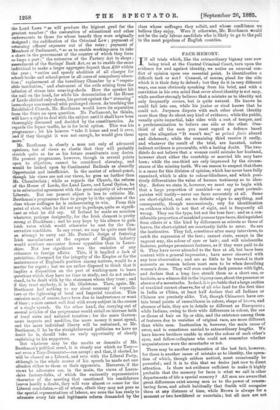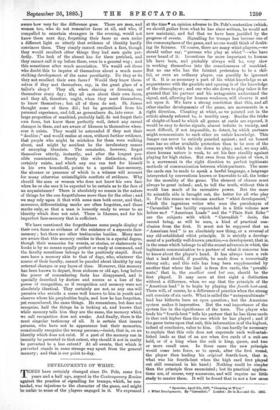FACE-MEMORY.
IN all trials which, like the extraordinary bigamy case now being tried at the Central Criminal Court, turn upon the evidence for and against identity, we notice an unusual con- flict of opinion upon one essential point. Is identification a difficult task or not ? Counsel, of course, plead for the side which it is their duty to defend ; but they do it in very different ways, one man obviously speaking from his brief, and with a conviction in his own mind that error about identity is not easy, while another strongly believes that a mistake as to identity not only frequently occurs, but is quite natural. He knows he could fall into one, while his junior or rival knows that he could not. Jurymen dispute with each other about identity more than they do about any kind of evidence; while the public, usually quite impartial, take sides with a sort of temper, and a predetermination to believe one side or the other. One- third of all the men you meet regard a defence based upon the allegation "It wasn't me," as prinzci facie absurd and dishonest; while the remaining third receive it easily, and whatever the result of the trial, are haunted, unless indirect evidence is procurable, with a lasting doubt. The two- thirds do not believe that a woman could mistake her husband, however short either the courtship or married life may have been; while the one-third are only impressed by the circum- stance of the missing tooth. We see reason to suspect that there is a cause for this division of opinion, which has never been fully examined, which is akin to colour-blindness, and which posi- tively differentiates the value of human testimony as to iden- tity. Before we state it, however, we must say to begin with that a large proportion of mankind—as any great portrait- painter will testify—never see faces accurately at all. Some are short-sighted, and see no definite edges to anything, and consequently, though unconsciously, rely for identification on evidence which is not that of sight, and is frequently all wrong. They see the type, but not the tree face; and as a con. siderable proportion of mankind poisess type-faces, distinguished from others of a like kind by differences as minute as those of leaves, the short-sighted are constantly liable to error. So are the inattentive. They fail, sometimes after many interviews, to catch the expression of the face ; cannot state, except in the vaguest way, the colour of eyes or hair ; and will misdescribe features, perhaps prominent features, as if they were paid to do it. They have never attended to the face at all, bat have been content with a general impression ; have never observed with any true observation ; and are as little to be trusted in their accounts as women believe most men to be when describing women's dress. They will even confuse dark persons with light, and declare that a long face struck them as a short one, or hesitate, as a witness did in the bigamy case, about the presence or absence of a moustache. Indeed, it is probable that a large section of mankind cannot observe, for of all who land for the first time in India or China, at least half declare that all Indians or Chinese are precisely alike. Yet, though Chinamen have cer- tain broad points of resemblance in colour, shape of brows, and absence of hair, they are in details as different as Europeans ; while Indians, owing to their wide differences in colour, the use or disuse of hair on lip or chin, and the existence among them of features due to varieties of original race, are more different than white men. Inattention is, however, the main cause of error, and is sometimes carried to extraordinary lengths. We have known brothers unable to state the colour of each other's eyes, and fellow-collegians who could not remember whether acquaintances wore the moustache or not.
There may be another explanation of the last fact, however, for there is another cause of mistake as to identity, the opera- tion of which, though seldom noticed, must occasionally be powerful ; and it is to this that we desire just now to direct attention. Is there not evidence sufficient to make it highly probable that the memory for faces is what we call in other departments of life a special memory P All men are aware that great differences exist among men as to the power of remem- bering faces, and admit habitually that Smith will recognise them at any distance of time, while Brown is always for a moment or two bewildered or uncertain; but all men are not aware bow very far the difference goes. There are men, and women too, who do not remember faces at all, and who, if compelled to entertain strangers in the evening, would not know them next day, forgetting their faces as seen under a different light so utterly that evidence of identity hardly convinces them. They simply cannot recollect a face, though they would recollect other things they had seen quite per- fectly. The look of the absent has for them perished, and they cannot call it up before them, even in a general way ; and this sometimes after much association. We would ask those who doubt this to inquire of themselves about a much more striking development of the same peculiarity. Do they or do they not recollect their own faces ? Would they know them- selves if they met themselves, say, in the great glass of a tailor's shop P They all, when shaving or dressing, see themselves every day ; they all care about their own faces, and they all, therefore, ought, when they meet themselves, to know themselves ; but all of them do not. St. James thought none of them did ; but he generalised from his personal experience, and fell, as generalisers do, into error. A large proportion of mankind, probably half, do not forget their own faces, but know them perfectly well, detect any casual changes in them, and are aware of likeness to themselves when- ever it exists. They would be astounded if they met their "doubles ;" and would realise at once, without further evidence, that people who might be mistaken for them were walking about, and might by accident be the involuntary causes of annoying blunders. The remainder, however, forget themselves utterly, instantly, and after the longest pos- sible examination. Surely this wide distinction, which certainly exists, and which any one can teat for himself in his own household, points to a special face-memory, the absence or presence of which in a witness will account for many otherwise unintelligible conflicts of evidence. Why should the man or woman who does not know his own face when he or she sees it be expected to be certain as to the face of an acquaintance? There is absolutely no reason in the nature of things for the one forgetfulness more than for the other ; and we may rely upon it that with some men both occur, and that, moreover, differentiating marks are often forgotten, and those marks only, so that a man is honestly ready to swear to an identity which does not exist. There is likeness, and for his imperfect face-memory that is sufficient.
We have mentioned the forgetfulness some people display of their own faces as evidence of the existence of a separate face- memory ; but there are other testimonies besides. Many men are aware that this memory resides in them in a special degree, though their memories for events, or stories, or statements in books is by no means equally perfect or ready at command, and the faculty sometimes belongs to the positively stupid. Such men have a memory akin to that of dogs, who, whatever the source of their faculty, cannot be puzzled about identity by any external changes or any lapse of time. Moreover, this memory has been known to depart, from sickness or old age, long before the power of remembering facts has disappeared, and is specially described by doctors and nurses as a loss of the power of recognition, as if recognition and memory were not absolutely identical. They certainly are not, as any one will perceive who revisits a scene well known to him in youth and observe where his perplexities begin, and how he has forgotten, yet remembered, the same things. He remembers, but does not recognise, half the things he is looking at, and knows that while memory tells him they are the same, the memory which we call recognition does not awake. And finally, there is the most singular testimony of all. It is certain that insane persons, who have not to appearance lost their memories, occasionally recognise the wrong persons,—insist, that is, on an identity which does not exist. If a part of the memory can in insanity be perverted to that extent, why should it not in sanity be perverted to a less .extent P At all events, that which is perverted stands in some strange way apart from the general memory ; and that is our point to-day.



































 Previous page
Previous page